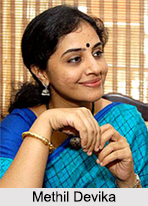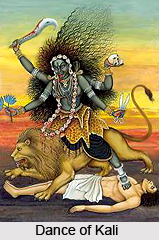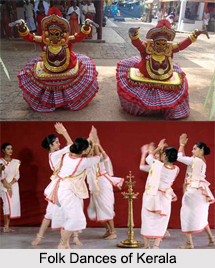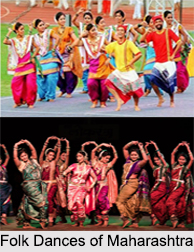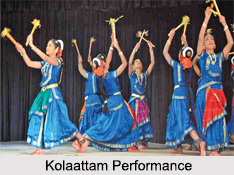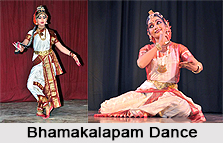 The most important and famous types of the traditional folk dramas in Andhra Pradesh are "Bhamakalapam" and "Gollakalapam" written by Siddhendra Yogi in the 16th century, to retain the sanctity of dance from the prostitute-dancers. For doing that he trained a whole clan of boys, chosen from Brahmin community and initiated into this form of art. Later on, "Bhamakalapam" gained more popularity and attained classical heights. It contains elaborate expressions and complex gesture adhered in by Kuchipudi dance. But in "Gollakalapam" philosophical plot forms the base of this drama, since it is a philosophical play which explains the philosophy of God"s persisting appearance on this earth, whenever, there have been threats to Dharma.
The most important and famous types of the traditional folk dramas in Andhra Pradesh are "Bhamakalapam" and "Gollakalapam" written by Siddhendra Yogi in the 16th century, to retain the sanctity of dance from the prostitute-dancers. For doing that he trained a whole clan of boys, chosen from Brahmin community and initiated into this form of art. Later on, "Bhamakalapam" gained more popularity and attained classical heights. It contains elaborate expressions and complex gesture adhered in by Kuchipudi dance. But in "Gollakalapam" philosophical plot forms the base of this drama, since it is a philosophical play which explains the philosophy of God"s persisting appearance on this earth, whenever, there have been threats to Dharma.
Concept of Kalapam
"Kalapam" is a kind of traditional dance-drama, simpler in its thematic development and affects on minds of audience by its direct moral appeal. It is a mono-play, characterizing one main person and another less important than him. Some times, this is also termed as "one-act play" in folk form. While the main character narrates his or her experiences, the other one encourages by asking questions or making comments.
Bhamakalapam in Kuchipudi
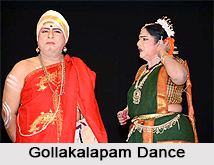 "Bhamakalapam", a 16th-century dance drama from the South Indian dance form of Kuchipudi. It is the most popular drama dance in the Kuchipudi repertoire. Bhamakalapam involves 3 dancers: Satyabhama, her female confidante Madhavi who shifts to a male character Madhava through the course of the drama, and Krishna. Satyabhama, one of the wives of the Hindu deity Lord Krishna, elaborates on her experience of love and separation from her divine husband.
"Bhamakalapam", a 16th-century dance drama from the South Indian dance form of Kuchipudi. It is the most popular drama dance in the Kuchipudi repertoire. Bhamakalapam involves 3 dancers: Satyabhama, her female confidante Madhavi who shifts to a male character Madhava through the course of the drama, and Krishna. Satyabhama, one of the wives of the Hindu deity Lord Krishna, elaborates on her experience of love and separation from her divine husband.
In the context of Bhamakalapam, it implies a collection of songs in various metres depicting the varied moods of Satyabhama. Apart from Bhama, the "sutradhara", the director of the performance, takes the role of the second character, Madhavi, who is Bhama"s maid.
Gollakalapam in Kuchipudi
The story of "Gollakalapam" is a simple representation of complex concepts of Indian spirituality. A witty Golla Bhama indulges in a repartee with a Brahmin, challenging his supposed supremacy over other humans by virtue of his caste. Two complex concepts "Pindotthpatthi" and "Yagna Pattu" are debated in a crisp manner, and the Golla Bhama enlightens the Brahmin on the equality of all human beings, and the unity of Godhead. To elucidate such complex concepts in a way which is equally appeasing to learned scholars and illiterate spectators, incorporating humor, wit and fantastic acting is no mean feat, and hence Gollakalapam is a treat particularly looked forward to watch.
